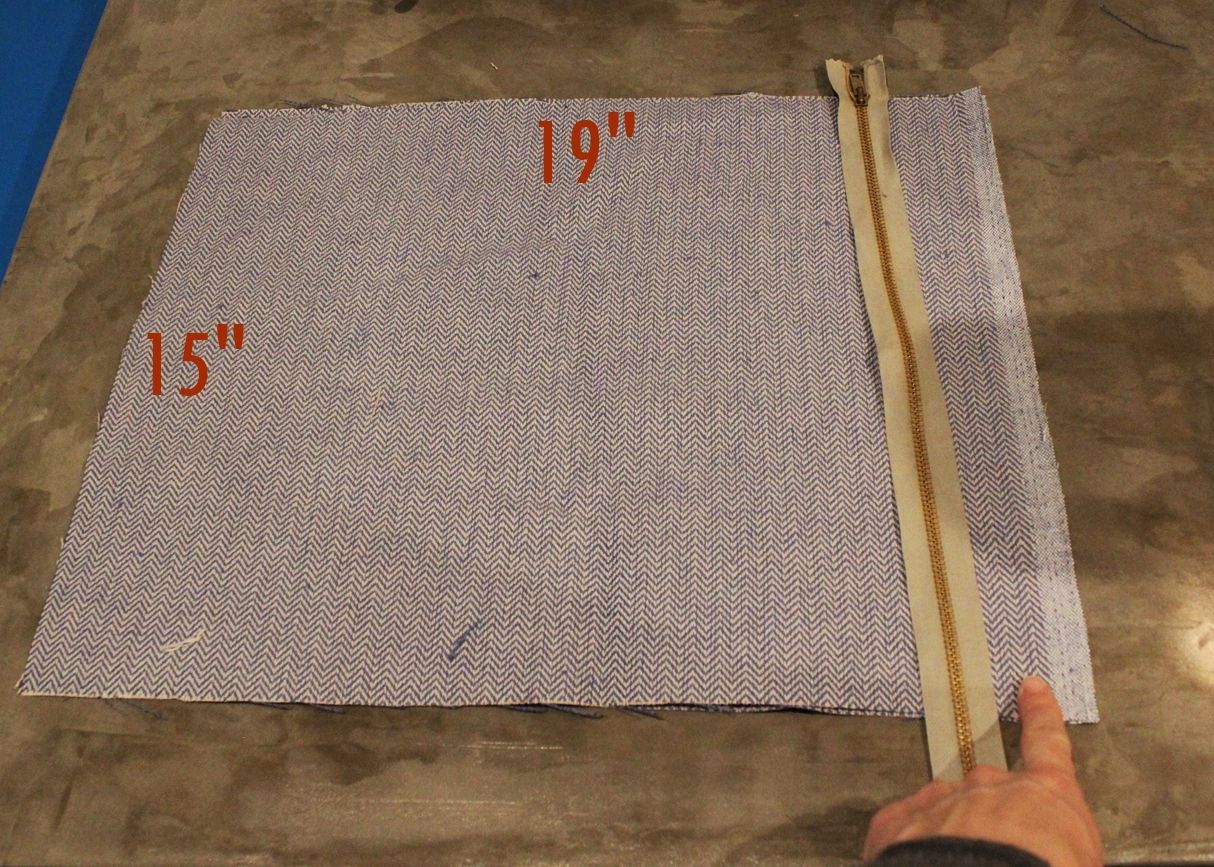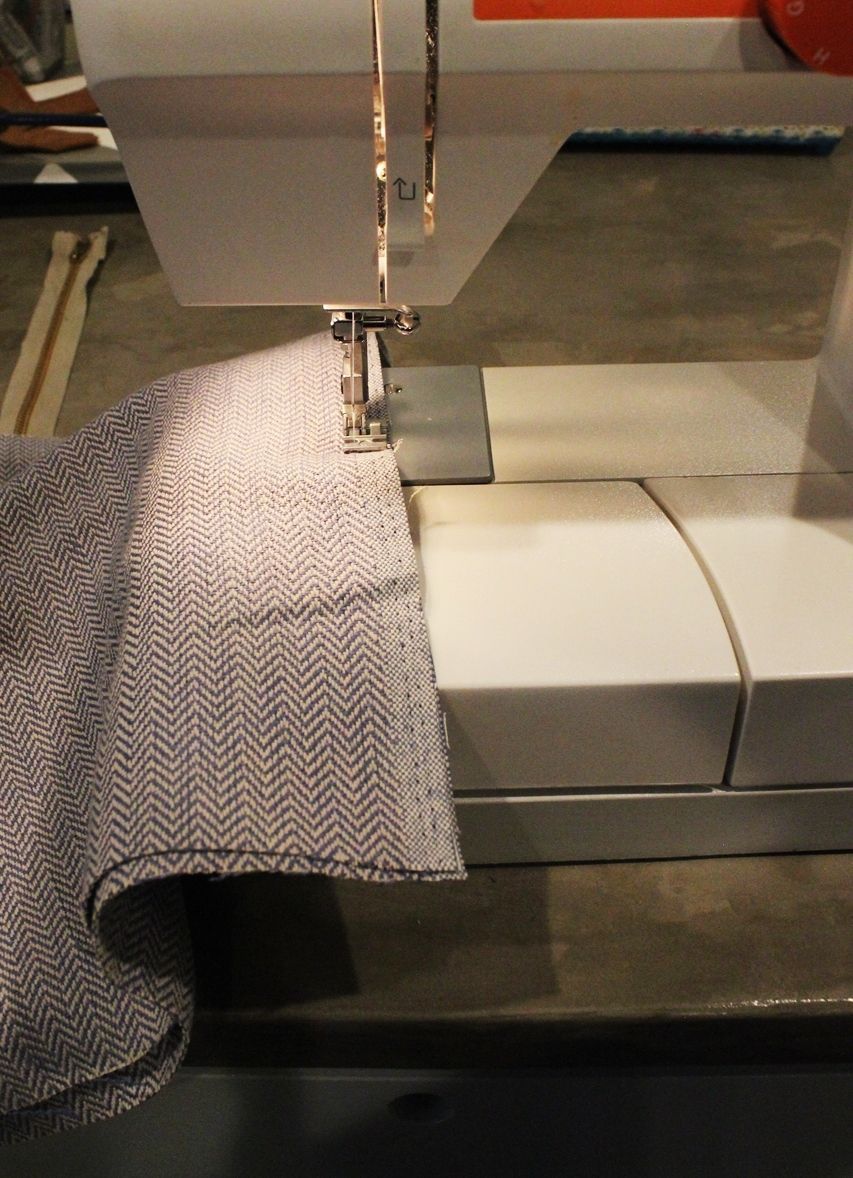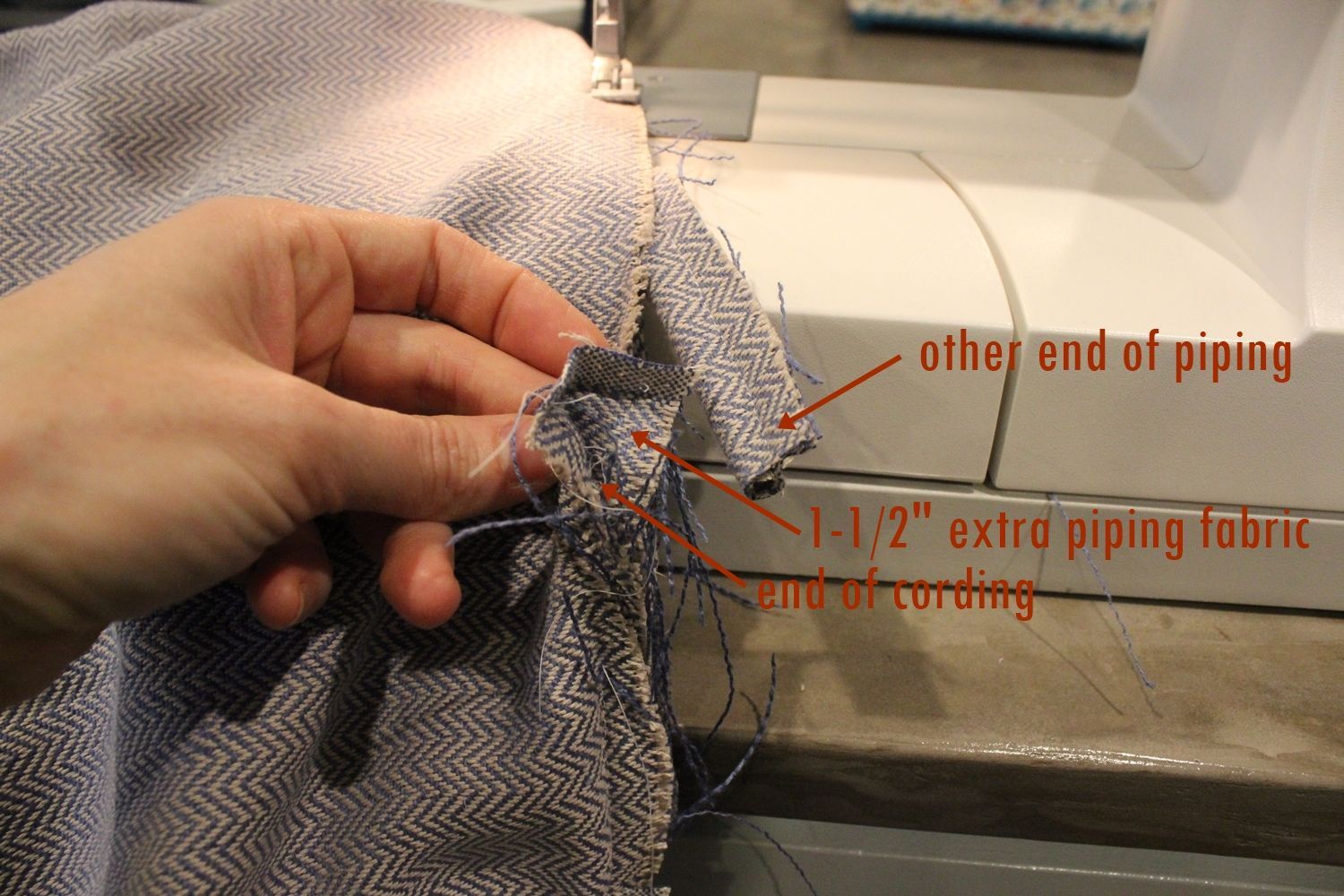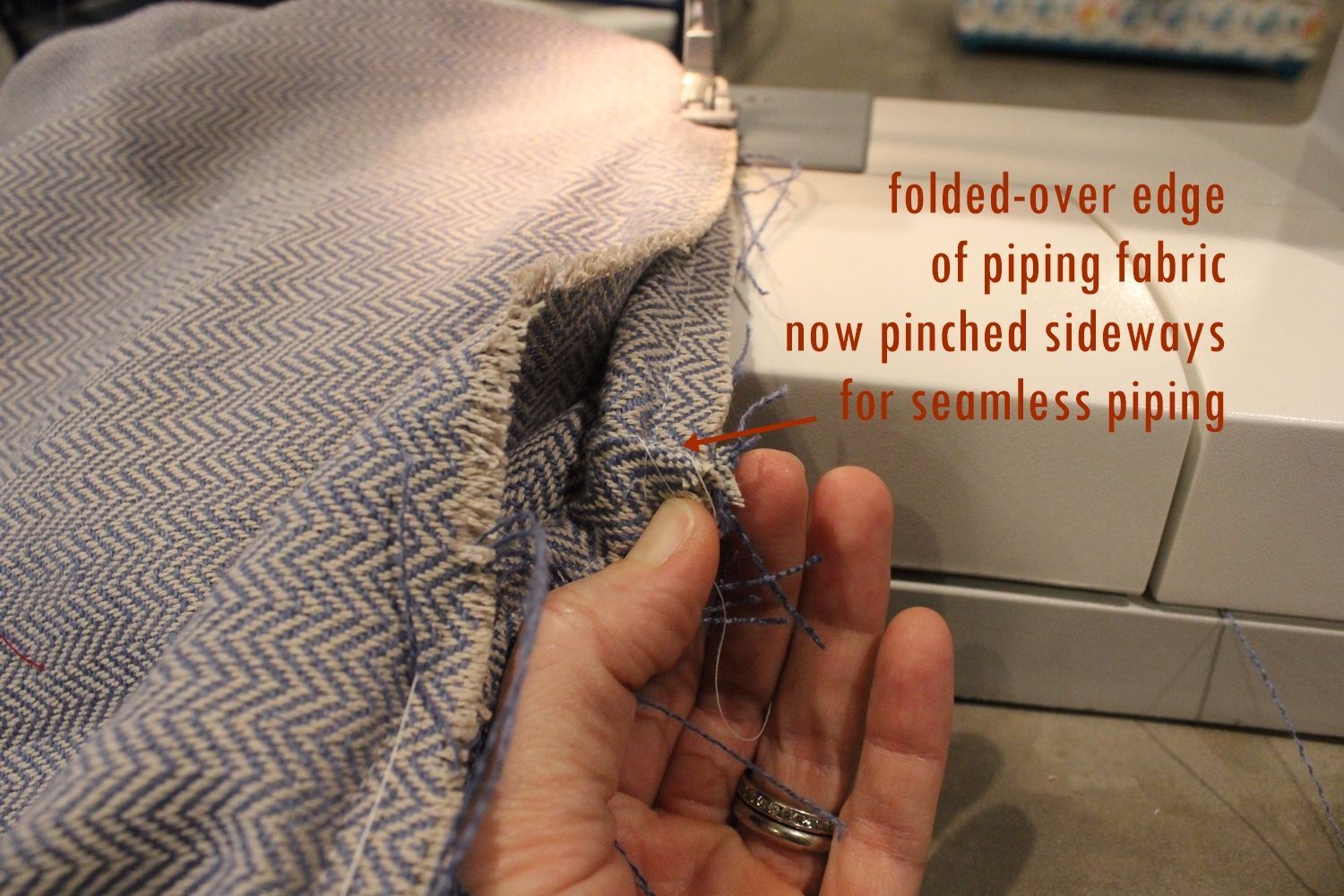The pouf ottoman is one of the most versatile small-furniture pieces around. They amp up the friendliness of a space immediately and come in many shapes.
This step-by-step guide will demonstrate how to make your very own DIY pouf ottoman cube including tips and tricks to make it a breeze.

How To Make a Large Pouf Ottoman
DIY Level: Beginner to intermediate sewing skills

Materials Needed for Square Pouf Ottoman:
- 1-1/2 yds durable (e.g., upholstery or outdoor) fabric, cut into two (2) 19”x19” squares and four (4) 19”x15” rectangles
- 6 yds piping (brief description on how to make your own included in this tutorial)
- One (1) zipper at least 15” long
- One (1) bag of 100L polystyrene balls (or 3-4 cubic feet)
- Upholstery thread
- Iron
Step 1: Begin cutting the fabric for the pouf ottoman
If you haven’t already, begin by cutting your heavy-duty fabric.
Be sure to use heavy upholstery or outdoor fabric due to its durability and hardiness.
You’ll need two 19”x19” squares (these will be the top and bottom of your pouf) and four 19”x15” rectangles (these will be the sides, so make sure they align the same way if your fabric has a pattern).
Step 2: Prep presewed piping or make your own
Prep your presewn piping for the next steps.
Want to make your own piping instead?
You may cut strips of the fabric of your choice about 3” wide; sew several together to make a long (about 6 yards) strip.
Lay cording (purchased at a craft/fabric store or through a local upholsterer) down the center of the WRONG side of your piping fabric, then fold so the right sides are showing and sew tightly together using your sewing machine’s zipper foot.
Step 3: Stack fabric atop one another
Take two of your side pieces (19”x15”) and lay them on top of each other, RIGHT sides in.
Step 4: Begin sewing these sides together
Use your sewing machine’s largest stitch (called a baste stitch) to sew one piece’s short (15”) side to the other piece’s short side.
Step 5: Once sewn, iron the seam down
Press the basted seam open with an iron.
Step 6: Place your zipper
With the RIGHT sides facing down, place your zipper face-down so the zipper itself lies directly on the seam.
Your zipper pull should only be about 1/2″ down from the top of the seam-edge.
Step 7: Pin the zipper once placed
Pin zipper into place.
Note: Unless you’re using a heavy duty zipper (above), be sure to keep your zipper fully closed. It’ll be much easier to sew this way.
Step 8: Sew your zipper to the pouf ottoman fabric
Use your zipper foot to carefully sew the zipper into place.
Step 9: Rip the seam open
When your zipper is attached, use a ripper to rip the baste seam open.
Step 10: Repeat steps above for the other side
Grab your other two side pieces (19”x15”) and, placing right sides together, sew the short sides together and then to the two zipper side pieces.
You should have a tube of sorts, with all the short (15”) sides sewn together.
Step 11: Begin to pin together the different components
Lay your tube down, RIGHT side up, then lay your piping on top of the edge with the raw edges together and aligned, then grab one of your 19”x19” squares and stack, WRONG side up, on top of the piping.
Make sure raw edges are all aligned for all three components (side-tube, piping, and square), and make sure the corners of your 19” square lines up with the corner seams of the tube.
Leave yourself about 4” of piping, just dangling, before starting to pin the piping.
Pin into place, all the way around (until you get to the end of the piping; just leave the last 4” for now – but DON’T cut your piping yet, just let the extra 3 yards dangle for now).
If you find you need more or less length on a particular side, you can adjust a side seam on your tube, if necessary.
Step 12: Work around the piping curves
Curve your piping around the right angle of your 19” square (think of the curves on a race track – they’re not going to be right angles, but they’ll be close curves).
Then have your tube seam split ever so slightly (like 1/2″ in) to follow the curve of the piping.
Pin into place, then sew together. Sew the three pieces together (tube, piping, and 19” square) all the way around the edges, minus about 4” from the beginning and 4” from the end of the piping.
Step 13: Cut the cording
Remember how you left the piping start and end dangling about 4” out? We’re going to finish up the piping before you complete the seam. Pull one end of your piping fabric down so about 1-1/2” of cording is exposed.
Cut off JUST the cording here; leave the piping fabric.
Pull the other end of your piping past the piping fabric’s edge, up to the cut end of the cording itself, and cut the piping so that it will just exactly touch the cut end of the cording.
Step 14: Fold the excess piping fabric
Now focus back on the cut end of the cording, with excess piping fabric. Fold down the top 1/2″ of the extra piping fabric.
This will be the exposed edge, visible on your pouf ottoman.
Step 15: Insert the other end of piping
Insert the other end of piping into the extra piping fabric (that extra piping fabric will be kind of like a hard taco shell for the other piping end).
The two ends of cording should touch – not overlap or gap too much.
Step 16: Pinch and pin into place
Pinch the raw sides of the extra piping fabric together to sandwich the other piping end inside.
Pin the now-seamless piping ends into place with your tube and 19” square piece.
Step 17: Sew raw edges
Sew up the raw edges like it’s regular piping under there.
Step 18: Flip inside out to see piping
Flip your tube right-side-out so you can see your piping.
Make sure the piping is nice and taut all the way around before moving on; if it’s loose or unattached somewhere, such as a corner, simply flip it back wrong-side-out and re-sew the seams.
Step 19: Run a zigzag stitch around raw edges
When everything looks good, run a zigzag stitch (or use your serger) all the way around the raw edges of your tube/piping/19” square seams.
Step 20: Repeat steps for other sides of tubing
Repeat piping attachment steps for the other side of your tube, using the rest of your piping and the other 19”x19” square piece.
Be sure to keep the right sides of the tube and square piece facing each other, and the piping sandwiched in between.
Also, take care to unzip your zipper at least a little bit about halfway through sewing this side, so you can access the zipper pull and open it to flip your fabric right-side-out when it’s all the way sewn up.
Turn it right-side-out.
Step 21: Snip away frayed threads
Snip any errant frayed threads close to your seams, taking care to avoid snipping your fabric or piping.
Step 22: Securely open polystyrene ball bag
Open up your bag of polystyrene balls carefully.
Step 23: Fill the oversized pouf ottoman
Use a funnel to transfer the polystyrene balls into the fabric pouf ottoman.
Shake your pouf every so often to settle the balls; you can fit more into your pouf ottoman than you might first think.
Leftover? Try this DIY kids bean bag chair.
Step 24: Plump the floor pouf ottoman up and enjoy!
Plump it out the way you like it. The zipper probably won’t get used a lot, but it’s nice to have so that you can refill polystyrene balls as needed over time.
You did it! You made your very own DIY pouf ottoman cube.
This DIY pouf ottoman is a wonderful addition to the form and function of your space, whether it’s a bedroom or living room or home office.
Of course, one of the great things about DIY projects is their customization – you can make this any size you want, really. This size works great for our space. My family especially loves how it comfortably fits small bodies…
…as well as larger ones. It really is comfortable on all counts!
Frequently Asked Questions (FAQ)FAQ
How to make a pouf ottoman?
Making a pouf ottoman large is pretty simple and easy! The hardest part is just deciding on the color; do you want a white pouf ottoman or a blue pouf ottoman? Also, the style; boho pouf ottoman or moroccan pouf ottoman? Once you pin down the color and style scheme, you really only have to follow a few steps with the help of a sewing machine!
What do you fill a pouf with?
The best material to fill a pouf with is polystyrene balls; however, you can use old pillows, blankets or even jeans!
Can you sit on a pouf ottoman?
Yes! You can sit on a pouf ottoman as long as it is large enough to support you. They come in all sizes, so be sure to make yourself an oversized pouf ottoman to fit it.
What is the standard size of an ottoman?
The standard size of an ottoman is between 13”-20” in height.
Can a pouf be used as an ottoman?
A pouf can be used as an ottoman, yes. They make excellent foot rests next to couches, or arm chairs in your living space.
What is the difference between a pouf and an ottoman?
The difference between the two is that a pouf is soft like an oversized pillow, where an ottoman is made from hard materials like wood, or plastic.
How do you make a homemade ottoman?
This is a more detailed DIY project. To make a homemade DIY ottoman, you’d have to source fabric, base material for legs, and filling. For this reason, making a DIY pouf ottoman is the best way to go; it’s less complicated, less expensive, and more fun.
Conclusion:
Whether you want to use a pouf ottoman for sitting on or resting your feet on, this piece of furniture is a definite great addition to your home. Rather than going out and buying a generic pouf ottoman from ikea or target, you can create a custom one that lasts! Go on, and get crafting.
The post DIY Pouf Ottoman Cube appeared first on Home Decorating Trends - Homedit.





























0 Commentaires